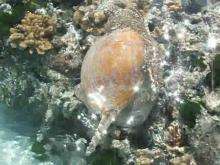Melo amphora
| Diadem volute | |
|---|---|
 | |
| Moving across the sand at low tide | |
| Scientific classification | |
| Kingdom: | Animalia |
| Phylum: | Mollusca |
| Class: | Gastropoda |
| (unranked): | clade Caenogastropoda clade Hypsogastropoda clade Neogastropoda |
| Superfamily: | Muricoidea |
| Family: | Volutidae |
| Genus: | Melo |
| Species: | M. amphora |
| Binomial name | |
| Melo amphora (Lightfoot, 1786) | |
| Synonyms | |
|
Voluta diadema Lamarck, 1816 | |

Melo amphora, common name the Diadem volute, is a very large sea snail, a marine gastropod mollusc in the family Volutidae, the volutes.
Etymology
The specific name amphora is the Latin word for vase, derived from the Greek amphoreus (αμφορεύς).
Distribution
This species distribution is restricted to the tropical southwest Pacific, from southern Indonesia and New Guinea to the northern half of Australia.[1]
Habitat
This large sea snail is known to live in littoral and shallow sublittoral zones. It usually dwells in muddy bottoms at a maximum depth of nearly 10 m.[1]
Shell description
The maximum shell length of this species is up to 500 mm, usually around 300 mm.[1]
This large shell has a bulbous or nearly oval outline. Its columella has three easily distinguishable oblique folds. The aperture is wide and near as long as the shell itself, and there is no operculum. It has a very large, inflated and posteriorly expanded body whorl. One of its most striking characteristiscs is the shoulder with proeminent and curved hollow spines. These spines tend to become obsolete in later stages of growth.[1] The spire is usually very short.
The color of the Melo amphora shell is said to be highly variable. It is commonly mainly coloured brown, white, or pale orange. It usually presents spiral darker brown banding. The interior is glazed, and is commonly coloured cream or pinky orange.[1]
Life habits

Feeding
Melo amphora is known to be carnivorous. It is usually seen feeding on other volutes, like Zebramoria zebra,[2] and may present cannibalistic behaviour, commonly feeding on smaller conspecific individuals.[3]
Human use
This species flesh is edible, and commonly used as food by native fisherman. The size and ornamentation of the Melo amphora shell makes it highly regarded as a decorative item. It is also known to be used as a water carrier, and as a bailer for fishing boats (like other species from the Melo genus).[1]
References
- 1 2 3 4 5 6 Poutiers, J. M. (1998). Gastropods in: FAO Species Identification Guide for Fishery Purposes: The living marine resources of the Western Central Pacific Volume 1. Seaweeds, corals, bivalves and gastropods. Rome, FAO, 1998. page 597.
- ↑ Wilson, B.R. and Gillett, K. (1971). Australian Shells. A & H. Reed, Sydney.
- ↑ F. E. Wells, D. I. Walker and D. S. Jones (eds.) (2003). The Marine Flora and Fauna of Dampier, Western Australia. Western Australian Museum, Perth.